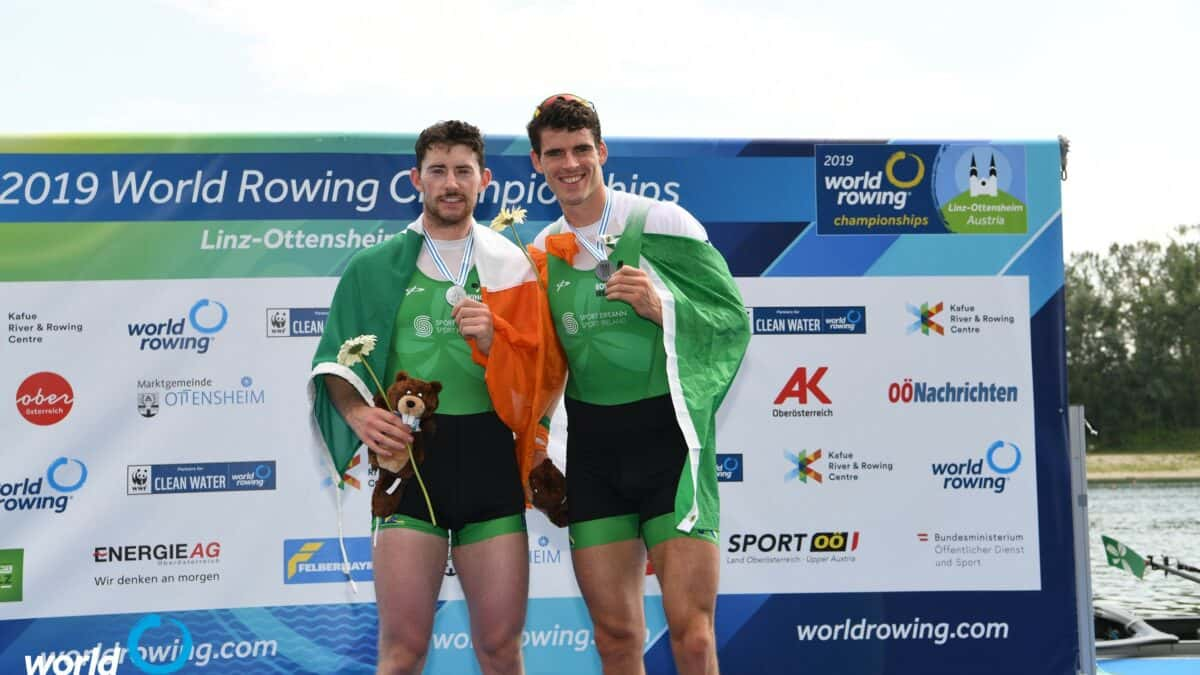
02 Jul 2020
Seeing the bigger picture. Doctor and rower Philip Doyle
Not only did they become world silver medallists in 2019, but they qualified their boat for the 2020 Tokyo Olympics. Doyle had meticulously planned his medical qualification schedule to fit in everything around his rowing training, and then the pandemic broke out.
World Rowing continues its series on how the COVID-19 pandemic has impacted the rowing community and the rowers’ response.
“I’m grand,” says Doyle in full Irish-style at the start of the interview. It was eight pm and he had completed a full day of work at the hospital and an endurance training session. “We have all the time in the world,” he says laughing.
His days are unbelievable to the average person. The morning often starts with a light training session, then off to the hospital to work a nine-hour shift. Then back home for another long endurance training session. After a bit of food and some ‘time off’ Doyle is back doing a weights session before climbing into bed.
The relentless schedule is the result of COVID-19 pandemic and the straddling of country lines. Doyle competes for Ireland, but he lives in Northern Ireland, which is a part of the United Kingdom. His medical training is governed by the UK system and it has imposed strict rules for the completion.
“If I had completed the Games and come back to my medical training, I would have finished with ten days to spare. I literally had ten days to play with and then all of sudden the Olympics were postponed for year,” he says.
Doyle’s hands were tied. He raced back to his hometown of Banbridge, near Belfast in Northern Ireland. He immediately contacted the hospital where he used to work asking them for a job.
“So, I had to go back as soon as possible and I wanted to go back as soon as possible. And also it means I can chip in and do something worthwhile,” Doyle says.
His love for medicine has always been his number one priority. “Rowing was never something I wanted to do. It was never on my horizon,” he says. And in the current situation, his perspective on sport, life and what it all means has shifted.
“I think the pandemic will take people’s eye off just themselves all the time, it will create an awareness for what everyone else is experiencing.
“It’s very easy, even I am guilty of it, rowing full-time, just being focused on me, my rowing performance all the time. Sport, in itself, you have to be selfish as an athlete. But I think this has really shown us, there’s a much bigger picture and it’s so important to be aware of everyone else’s situation around you,” Doyle says.
Hesitating, Doyle adds.
“It’s controversial, but the celebrities and the sports stars are nobody compared to the guy who is working on the check-out in your local supermarket when the world is in crisis. It shows the importance of what people contribute to society and what you actually do give back. I am not saying that sportspeople have nothing to give back, but it does really show you your actual importance and how vital you are the function of society.”
Doyle found himself in the tough situation a few weeks ago when he had a couple days off. For his training, it would have been best to travel down to Cork and get some time on the water at the training centre. But he didn’t go.
“I thought, that’s very selfish of me. What if I go down and get a couple of the athletes sick and I leave to go back to work and they’re all sick for a few weeks. It might not be worth that risk,” he says. Adding that his only fear in this crisis is getting someone else sick.
But despite everything, Doyle’s reticent love of the sport still shines through. He lights up talking about rowing, and especially about his doubles partner Ronan Bryne.
“Ronan, he is an astonishing rower. Technically terrible. I’m technically terrible, he’s technically terrible, but it just works,” he says laughing.
“We both want to do it for each other. But I suppose the main point is that Ronan is the talent and I’m the work horse.”
Looking to the future, Doyle has not settled on his plans. He wants to make it through his first Olympic cycle before committing any more time to the sport of rowing. In the meantime, he and Byrne continue to break Ireland’s indoor rowing records and set themselves up for Olympic success.

